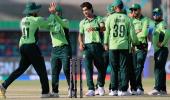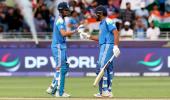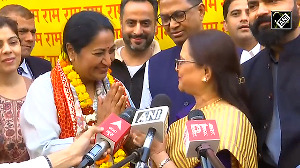'International cricket is incomplete without Pakistan.'

It was a smoggy morning in Lahore when Australian umpire Simon Taufel boarded the bus to the Gaddafi stadium for the second Test between Pakistan and Sri Lanka.
He made an exception to his superstitious habit of sitting in the same spot on the bus, particularly when the match was going well. Instead, he sat in the back, and Ahsan Raza, the fourth umpire, took his spot.
That day -- March 3, 2009 -- is etched in Taufel's memory and recounted in detail in his book, Finding the Gaps. It's the day that shook the world of cricket and made teams wary of playing on Pakistani soil.
'As the buses -- one carrying the Sri Lankan team -- were about a kilometre from the stadium, two cars with terrorists opened fire indiscriminately, killing the driver and injuring Raza,' writes Taufel, a five-time winner of the International Cricket Council Umpire of the Year award, in his book.
'A torrent of bullets continued to rain down. The smell of gunpowder hung precariously in the air, and the seats were sprinkled with glass shards.'
It was the first time cricketers and match officials had come under direct terrorist fire. The attack plunged Pakistan into isolation.
The Mumbai terror strike of November 2008 had already exacerbated the bitterness between India and Pakistan, prompting the Board of Control for Cricket in India to sever cricketing ties with its neighbour.
After 2009, others followed suit. No international team would travel to Pakistan in the next decade until October 2019, when Sri Lanka became the first team to return to Pakistan, signalling international cricket's slow and tentative return to these shores.

Now, Pakistan is gearing up to host the ICC Champions Trophy from February 19 to March 9. This is the first ICC tournament being staged in Pakistan in 29 years.
The hosts come to this marquee 50-over tournament as defending champions, having lifted the trophy in the previous edition in England, in 2017 after defeating India.
There is hope this tournament will turn the country's fortunes. Pakistan's economy has been in a tailspin, and incidents of terrorist attacks in the country have increased.
"I am confident that the Champions Trophy will go a long way in lifting the mood of the nation," former Pakistan middle-order batter Basit Ali, who plied his trade in the 1990s, tells Business Standard over the phone from Karachi.
Former Pakistan fast bowler Wahab Riaz believes this tournament will help his country reclaim its place in world cricket.
"There is so much talent in this country. International cricket is incomplete without Pakistan," he says.
Amid the frenzy, there's also a sense of lament. The reason: Imran Khan -- arguably Pakistan's greatest cricketer who led his team to the epochal 1992 World Cup triumph in Australia.
Khan, 72, who also served as the country's prime minister from 2018 to 2022, is currently languishing in a Lahore prison.
He was handed a 14-year sentence after being found guilty of selling state gifts from the Toshakhana (state treasury).
"In the midst of this political turmoil, the Pakistan government under Prime Minister Sharif is keen to showcase its soft image to the world by hosting this ICC event," Lahore-based journalist M Zulqernain Tahir tells Business Standard.
"Rather, it is desperate to tell the world that the country is a safe place for such tournaments."
Tahir and Ali assert that India's presence in Pakistan would have been just the shot in the arm the country needed.
"India is a cricketing superpower, and their presence in Pakistan would have been the perfect ice-breaker for both the countries, given their history," Tahir says.
Ali weighs in: "I don't want to talk about the hybrid model, but if the Indian team would have come to Pakistan, the people of our country would have been able to watch India's cricketing icons from close quarters."
The hybrid model he is referring to is an agreement ratified by the ICC in which India's matches in the eight-team Champions Trophy will be held at a neutral venue -- Dubai in the United Arab Emirates.
In the near future, starting 2026, when India hosts ICC tournaments, Pakistan too will play at neutral venues.

Leaving no stone unturned to make the Champions Trophy a resounding success, cash-strapped Pakistan has spent approximately 17 billion Pakistani rupees (roughly Rs 529 crore/Rs 5.29 billion) for the renovation of stadiums in Lahore, Karachi and Rawalpindi.
Prime Minister Shehbaz Sharif raised the stakes for the Pakistan team, proclaiming that their real task was to not just win the Champions Trophy but also quell India in the clash on February 23 in Dubai.
With Pakistan and India's storied rivalry, the high-voltage face-off carries an element of intrigue.
India has dominated ICC events since the 1990s, but Pakistan's stunning T20 World Cup victory in 2021, coincidentally in Dubai, proved they have the calibre to turn the tide.
Playing marquee India-Pakistan matches comes with its inherent challenges.
A guest on Kapil Sharma's show, Pakistan cricketing legend Wasim Akram narrated an incident following his team's 1996 World Cup quarter-final loss to India in Bengaluru.
'After that game, I received a call from a top PCB (Pakistan Cricket Board) official who told me: "Aap Lahore waapas mat aayie. Kahin aur chale jaiye (Please don't return to Lahore; go somewhere else)".'
'I replied, "Mein Pakistan captain hoon. Lahore nahin aaonga to kahan jaaonga? (I am the Pakistan captain. If I don't return to Lahore, where will I go?)",' Akram recalled.
The Sultan of Swing, who had missed that game due to an injury, did well to follow the PCB official's advice. He quietly flew to London to escape the wrath of his fans.
It is the political garnish that adds spice to the India-Pakistan rivalry.
'There is a crucial element about an India-Pakistan match. You either become a superstar, or become a zero, and get chucked out,' former India opener Virender Sehwag narrates in the Netflix series, The Greatest Rivalry: India vs Pakistan.
What makes this rivalry so riveting is that these teams don't play in bilateral series anymore.
These days, fans from both sides of the border have to make do with matches only during ICC tournaments.
While both teams have won World Cups, their meetings at such global events are always keenly watched and eagerly awaited.
For the broadcasters, it is an opportunity to jump on to the bandwagon with another 'Mauka, Mauka' ad.
The last time India travelled to Pakistan for a bilateral series was in 2006. (Pakistan won that three-match Test series 1-0.)
Sadly, cricket in Pakistan gets intrinsically linked to extremism.
Ali has the final word: "Terrorism has no religion. The perpetrators of the Lahore attack are enemies of humanity."
The country, he says, has been festering deep wounds, and this tournament could -- "Inshallah" -- be the balm it desperately needs.
"The fact that the ICC has shown faith in Pakistan (to host the Champions Trophy) shows that we have come a long way since March 3, 2009."
Feature Presentation: Ashish Narsale/Rediff.com













 © 2025
© 2025